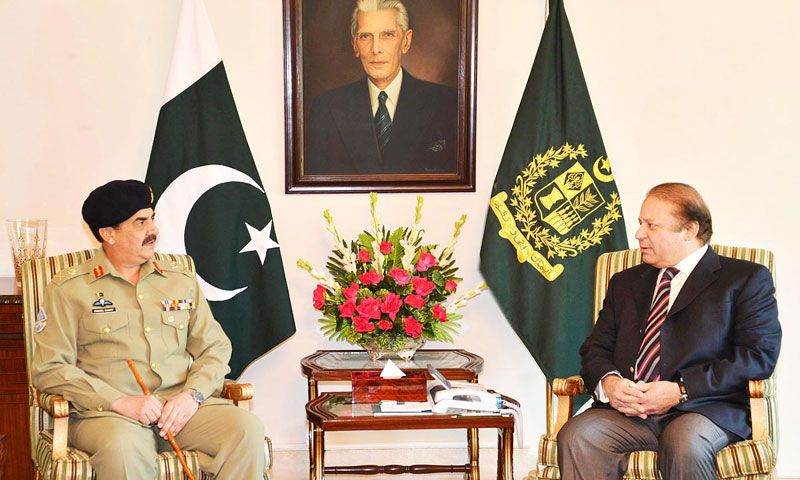Pakistan Names New ISI Chief
General Raheel Sharif and Pakistani Prime Minister Nawaz Sharif

NEW DELHI: Lt. Gen Rizwan Akhtar was named the new chief of Pakistan’s Inter Service Intelligence (ISI), as current chief Lt Gen Zaheerul Islam and five Lieutenant Generals are due to retire from service in the first week of October.
The announcement was made on Monday by Pakistan’s Director General Inter Services Public Relations (ISPR) Major Asim Bajwa on Twitter:
Six Major Generals were promoted to the rank of Lieutenant General:
As per procedure, the army chief, currently General Raheel Sharif, recommends a panel of Lieutenant Generals to the Prime Minister, currently Nawaz Sharif, who then makes the final choice.
However, rumour has it that Lt Gen Islam’s appointment was made in 2012 as then army chief Gen Ashfaq Parvez Kayani sent only Islam’s name for consideration, indicating that the civilian government, then led by the Pakistan People’s Party, has no choice in the matter.
At the time, the PPP government was battling the memogate controversy, revolving around a memorandum ostensibly seeking help from the Obama administration to aid the Pakistani government in averting a military takeover.
This time, too, the civilian government, led by Nawaz Sharif’s Pakistan Muslim League - Nawaz (PML-N), is facing a political crisis, with protests led by Pakistan Tehreek-e-Insaf (PTI) and the Pakistan Awami Tehreek (PAT) calling for the government’s resignation. More significantly, many analysts believe that the army had a hidden hand in the protests in a bid to weaken the civilian government.
Hence, given the current scenario of civilian-military relations, Pakistani political circles were rife with speculation on the ISI chief’s appointment. In terms of specific names, Lahore Corps commander Lt-Gen. Naveed Zaman was touted by many as the frontrunner, with National Defence University president Lt-Gen. Javed Iqbal Ramday, who played a key role in the operations against the Tehreek-e-Taliban Pakistan (TTP), Maj-Gen. Nazeer Butt and Maj-Gen. Rizwan Akhtar, who, till his promotion, headed the Sindh wing of the Pakistan rangers, rounding up the list.
From the above it is evident that Lt Gen Akhtar was not the senior most candidate. However, the fact that there was a military development regarding promotions in the offing, an educated guess involved the addition of these promoted names to the pool.
Whilst some believe that a new entrant would not make the cut, others mused that Gen Raheel Sharif would like to appoint an ISI chief who will coincide with or even last his own tenure as army chief. This latter line of thinking made the promoted officers likely candidates, as eight older officers would thereby not be in the running. Precedence also allows for it, as evinced by the example of former ISI chief and now retired Lt Gen Shuja Pasha, who was given the ISI assignment immediately after his elevation to Lieutenant General.
Further, Gen Sharif is known for handing out important posts to younger generals, an example being the appointment of Chief of General Staff Lt Gen Ashfaq Nadeem.
Whilst Pakistani analysts, politicians and the common man/woman follow the developments closely, policy makers in New Delhi will follow suit, as the ISI chief is known to influence Pakistan’s foreign policy and military strategy.
Sources indicate that the current ISI chief, Gen Islam, was instrumental in formulating Pakistan’s response when tensions with India boiled over the killing of Indian soldiers along the Line of Control.



